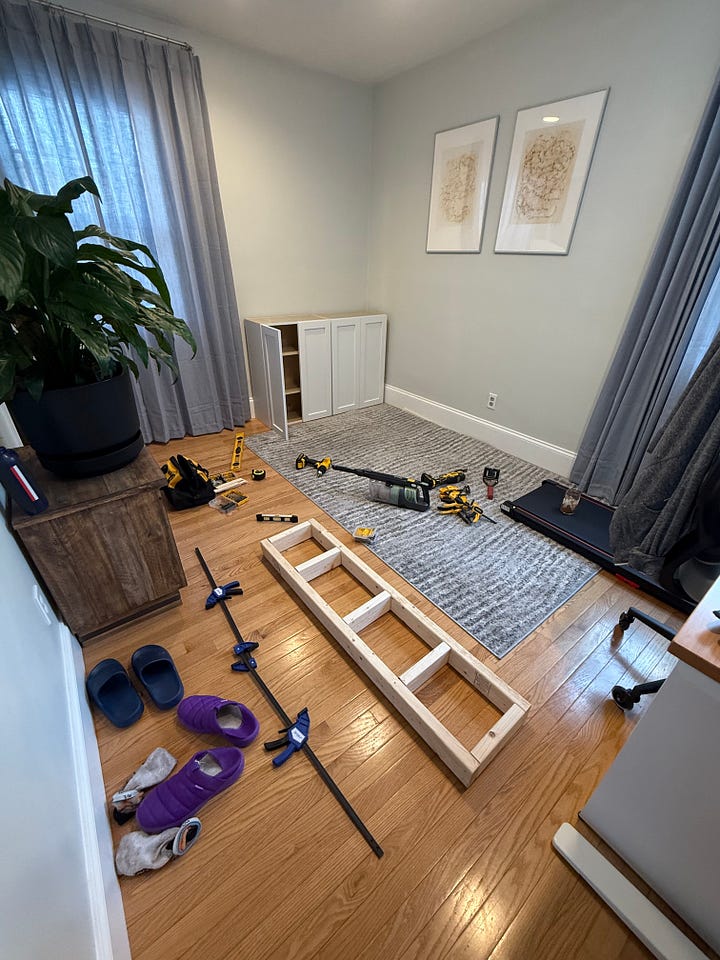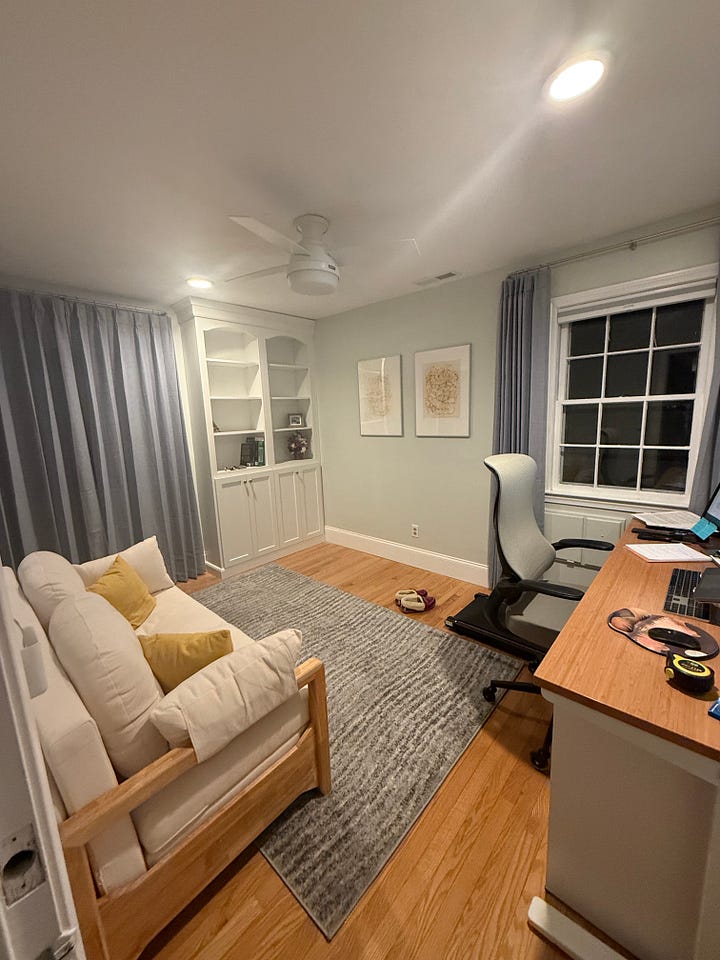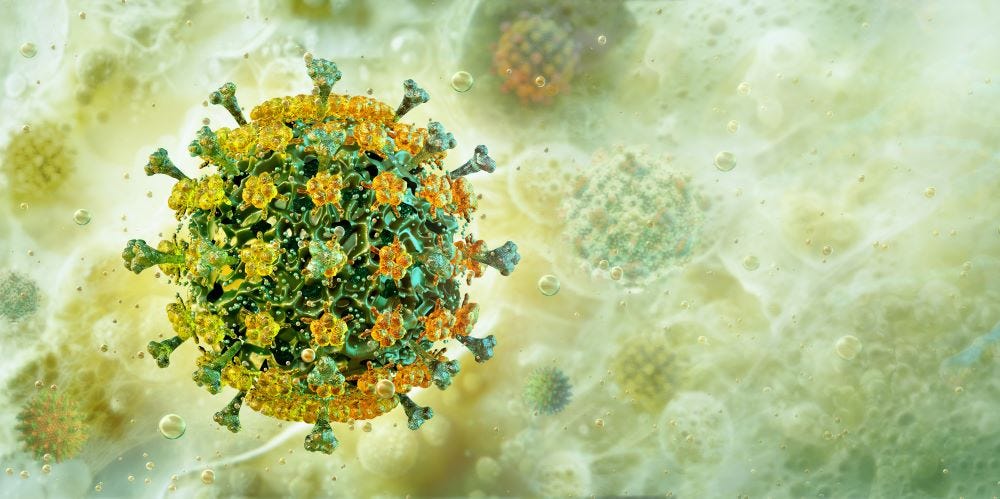The ground feels like it’s shifting under us rapidly (you know, like in climate change). Our jobs remain the same (go to work, help everyone we can, do paperwork until our fingers fall off), but healthcare is transforming. Here are three changes we’ve already felt, what we are afraid of happening, and how we are coping.
Dr. Vicky, Neonatal Intensive Care:
1. Documentation dangers.
I am worried that my documentation may inadvertently damn patients. Specifically, mostly for:
Undocumented patients.
Access to the NICU is already restricted (we barely let grandma come by) so ICE won’t be easily let in. But the multidisciplinary team discharge planning documentation, which describes arrangements for patients who are unhoused or living in a shelter, may be perceived as a proxy for undocumented status. Clearly, our discharge practices will need to adapt fast (a speed hospital processes rarely achieve; current efforts are sloooow). As will our follow up arrangements. Follow-up care is hard for anyone, let alone for a family with a new baby, let alone for a family who may be nervous about encountering ICE at the clinic. I hope necessary outpatient care for infants (and all other family members!) is not delayed or foregone.
Pregnant people.
We have approximately a billion acronyms and equations in the NICU, to prove how smart and insular we are. One shorthand we use to describe birthing people is “Gs and Ps.” Stay with me: G stands for gravidity (pregnancies), and P stands for parity (births). For example, we will say either G5P3 (5 pregnancies, 3 births), or more extensively G4P0122. This string of numbers tells me that a person had four pregnancies; of those, 0 were term, 1 was preterm, 2 were abortions or miscarriages, and 2 are living.

In most circumstances, abortions and miscarriages are between a person and their uterus and their doctor. In the NICU, succinctly capturing that much history is helpful, in terms of preparing for different kinds of deliveries and in thinking about diminished fertility. Knowing about recurrent pregnancy loss can be informative in caring for a family and can illuminate next steps for a sick infant.
And yet, while I think this information is my beeswax in the case of a sick baby, it is certainly not the government’s. Given the disgusting efforts to criminalize abortion and establish personhood, I want no one’s Gs or Ps to fall into the wrong hands. But there we are, writing them in every note. A few of my obstetric colleagues are reconsidering their documentation of Gs/Ps, which may gum up the works but may also minimize punitive exposure. What no one needs is a shadow medical record existing alongside a real one (the real ones are tangled and messy enough), but that may happen.
2. DEI restrictions curtail disparities work.
Whether or not the government admits it, people from certain backgrounds suffer disproportionate mortality and morbidity, some of which is certainly preventable if we better understand it. Health disparities exist in every maternal and neonatal outcome you can think of (maternal death, neonatal death, chronic lung disease, breastfeeding; the list goes on and is so.so.long) along lines of race, ethnicity, socioeconomic status, natality, you name it. Look for example how much neonatal mortality rate differs for infants in New York City for infants from Puerto Rican backgrounds. Without devoting ourselves to this work, we will never narrow these gaps. Families will suffer unnecessary and unjust illness and death.

I’ve worked on neonatal equity but my job is full-time as a clinician, not researcher. My close friends in the equity space who are mostly research physicians are reeling from the anti-DEI changes. They fear losing their jobs, funding, and decades of progress toward justice. Some have received private reassurances from their leadership that their jobs are safe, for now (but the nature of their jobs may change substantially). They have not been academically silenced (yet); so far, they can still speak at conferences about disparities.
What’s been missing for me is adequate public support from the large institutions (and journals). I want all these institutions, who love to start every conference by acknowledging their extensive commitment to equity and also their presence on stolen land (absolutely accurate, but in these cases, woefully performative), to say that with their whole chest and loud enough for the people in the back to hear. If universities with endowments exceeding GDPs of small countries can’t say it, who can? If we permit the silencing of studies that even mention words pertaining to equity, the pronatalist supremacist agenda will succeed.
3. Information is harder to access and less reliable.
I’m grateful for the creators (Jessica Valenti, LIL Science) and organizations (ACOG) who preserved valuable documents when the CDC took them down. Archived pdfs do not truly updated medicine make, but it’s a better start than a wiped web page.
Potentially aging guidelines are one thing. Inaccurate communicable disease tracking is another. The MMWR was previously highly reliable. I trusted it implicitly, and knew that if an infectious illness was marching through the country, like, say, bird flu or say pockets of measles or tb, official sources would accurately reflect that. Unfortunately, recent editions of the MMWR have raised legitimate concerns for a lack of transparency. Trust, once lost, is not easily regained.
On my recent shifts, at least half the maternity floor had a viral illness. But which one? Standard viral panels only test for a few variants. Without access to accurate, updated tracking, risk assessments are misinformed. Do we test everyone for every possible thing? Who gets the negative pressure rooms? Who is allowed to see their baby in the NICU (full of vulnerable patients, who have naive, developing immune systems and some of whom have profoundly immature organs)? In the NICU we have to balance minimizing exposure with parents needing to spend time with their babies.
My biggest work fear.
I’m trying to brace myself against all these new realities. All of this stinks! If I had to pick just one work-related fear (there are so many to choose from, all worthy), what terrifies me most is what a national abortion ban and enshrined personhood would mean: preventable deaths, doctors afraid to provide care for fear of jail time, people forced to endure unwanted pregnancies, unable to make decisions about their own bodies. All of that is already happening, complete with a death toll.
What this will also mean is the criminalization of miscarriage and the moving of goal posts for fetal viability. Miscarriage is a devastating and grueling experience. It is so so hard, and so so sad. Criminalizing something so painful is beyond cruel.
Viability is a longer discussion. Pronatalism, personhood, and delusions about life beginning at conception (erection?) from people who coin falsehoods like “late-term abortions” will inevitably lead to a push to resuscitate increasingly younger fetuses. No amount of delusion nor resuscitation will lead to improved survival; it will only lead to suffering for everyone involved. Preventable, damaging, gruesome. I don’t know if I could keep working if I had to resuscitate a fetus against a parent’s will well below viability. Actually, I do know. I’d be done.
What I’m doing about it.
Look, mostly I’m eating (and trying to take our own advice). I’m talking to those coworkers who are equally distressed (which, somehow, is not everyone! Which is wild! Which is also painful! WTF!)
I spent a lot of time thinking about how I could, with my current skill set, contribute to the net good of reproductive access. I got my reproductive care from Planned Parenthood multiple times, was an abortion clinic escort, and a sexual assault and violence crisis volunteer; this work is close to my heart (and to my uterus, which is not the government’s beeswax).
In lieu of quitting my job to go provide abortions (tempting but not possible), I can still use my knowledge for good. The misinformed, venal, predatory liars running our healthcare at the federal level will only spread more misinformation and foment more fear. One of my acts of resistance will be to use my expertise in infant and birthing people’s health to stem the tide of lies. With the principles of transparency, empowerment and basis in science, I am going to write about what I think people should know about babies, pregnancy, reproductive care, and more, at Babies, Explained. I don’t have the platform or firepower of Jessica Valenti, my hero, but I can chip away at the misinformation, week by week, and help people find community during this impossible time. I hope it is helpful.
I am also going to keep eating, because it is also possible that I just haven’t eaten enough Cheez-Its to save our democracy. But who knows what is possible if I eat a few (ok, many) (ok, many many) more?
Dr. Kristina, Pediatric Emergency Medicine
1. Research Funding:
January 21st. Mark it on your calendars, folks, because that's the day my research dreams got a swift kick in the rear, courtesy of an executive order restricting National Institutes of Health (NIH) grant reviews. And wouldn't you know it, my grant application, the culmination of an entire fall's worth of planning, writing, presenting (all while juggling the usual ER clinical demands), went in on January 23rd. Timing, as they say, is everything. Or in my case, a cosmic wedgie.
Now, my supplementary grant isn't exactly going to break the bank. Compared to the NIH's hefty $48 billion budget, it's a rounding error. But still, it represented an opportunity to ask some tough questions about pediatric emergency care. The whiplash has been real. One minute, my mentors and collaborators—who are tackling HUGE issues like improving emergency care for ALL pediatric patients and figuring out the best way to keep the sickest kids alive before they even get to the hospital—are energized and helming enormous ongoing efforts. The next, we're all collectively staring into the abyss of confusing and contradictory messaging from on high. Apparently, improving care for children is a noble goal, unless, you know, it's not.
But don't worry, there's a light at the end of the tunnel! Some machinery is being allowed to resume. And guess what? My project is likely to survive the purge because it doesn't specifically mention DEI or gender ideology. I'm safe! Lucky me! (Please note the heavy sarcasm.) Apparently, the new administration won't come for me if I'm just trying to help all kids, regardless of their background. How... magnanimous?
Meanwhile, other brilliant scientists and physicians who are laser-focused on eliminating healthcare disparities? They're left twisting in the wind. Because apparently, caring about the larger community is now a controversial stance. When did we decide that some individuals matter more than others? When did "improving healthcare for all" become a radical statement? I'm genuinely asking. I went into medicine to help people, all people, regardless of their socioeconomics, skin color, country of origin, gender identity, or really anything that might be identified as “other”.
So, here I am, straddling the line between relief and utter disbelief. My grant might be safe, but the system that's supposed to support research that benefits everyone? That system is looking increasingly broken. And that, my friends, is no laughing matter. Though, if I don't laugh, I might just cry. And in the ER, tears are best reserved for the patients. After tears usually come popsicles.

2. Documentation dangers:
At the risk of sounding repetitive, I must reiterate Dr. Vicky's concerns about documentation. The emergency department is meant to be a sanctuary, open to anyone in need of medical care. But I fear we are jeopardizing that fundamental principle. The impact on the children I care for, particularly within targeted and vulnerable populations, will be profound and carry devastating unintended consequences.
Undocumented patients and families.
I’m deeply concerned about undocumented patients, especially children and those with undocumented parents. Let's be blunt: if I were to put myself in the shoes of an ICE sleuth seeking undocumented individuals, the ER would be a prime location. (It's not exactly where they want to be, trust me.) These families already face immense barriers to healthcare, often relying on the ER as their only recourse. While I have and always will prioritize emergency care over immigration status, I cannot ignore the precarious position these families are in. Even seemingly innocuous documentation of a recent arrival could inadvertently expose them, placing them in immediate jeopardy. Because "sanctuary" now comes with an asterisk.
Consider this: in our community, like many others, US-born children live with undocumented families. These children may be forced to navigate the healthcare system alone, shouldering a burden no child should bear. Research has demonstrated the far-reaching and devastating impact on the health, education, and economic well-being of US-born children with undocumented parents or guardians. We've recently had to specifically address the care of unaccompanied minors due to the very real fear that their parents will be deterred from seeking help, fearing exposure and repercussions. It's like a Kafka novel, but with less existential angst and more actual human suffering.
We must find a way to ensure that seeking medical care does not become a perilous act for undocumented children and their families (I'd suggest starting with empathy).

Trans and nonbinary patients.
I'm deeply concerned that documenting a patient's gender identity, preferred name, and pronouns—information crucial for providing informed and respectful care—could inadvertently expose transgender and nonbinary individuals to immense risk. Because in some circles, basic respect is apparently a radical act.
In today's climate of rampant transphobia and hateful rhetoric, particularly targeting this vulnerable population, seemingly innocuous information in a medical record can become a weapon. While our system aims to be inclusive, allowing patients to share their gender identity and lived name, the very act of recording this data creates a potential vulnerability. It's a Catch-22 for inclusivity.
Consider this: a trans patient seeking care for a seemingly unrelated issue may have their gender identity revealed through documentation, potentially exposing them to discrimination, harassment, or even violence, both within and outside the healthcare setting. This is not theoretical. Recent incidents, such as the targeting of a woman on Halloween in November 2024 and the harassment and assault of a teenager in August 2024 simply for living authentically, demonstrate the very real dangers facing this community, even in supposedly "liberal" areas.
We must acknowledge that simply living in a progressive area does not guarantee safety. The current political and social climate has emboldened those who seek to harm transgender and non-binary individuals, making privacy and discretion more critical than ever. I fear that my necessary documentation, intended to ensure appropriate medical treatment, could have unintended and devastating consequences. How can we guarantee the safety and confidentiality of our trans and nonbinary patients when simply acknowledging their existence in their medical record creates a potential pathway to harm?
3. Impact on pregnancy care in the emergency department
I do see pregnant teenagers in the emergency department (some planned, some unplanned). Now, before we jump to conclusions, let's talk law, Massachusetts-style. Here, if you're over 16, you can seek abortion care without parental permission. Under 16? You'll need a parent or guardian's okay, or a judge can grant you a "judicial bypass." (Think of it as legal permission to adult, even when your parents disagree.)
Now, before we get all hot and bothered about statistics, in 2021, only 7% of abortions in Massachusetts were for those under 20. So, while it happens, it's not exactly an epidemic of teen pregnancies.
Full disclosure: I'm spoiled here as an emergency physician in Massachusetts. In the wake of the Roe v. Wade overturn, our state took steps to protect reproductive and abortion care access. We even have specific protections for emergency abortion care and a reaffirmation that life-saving emergency care for women won't be compromised.
But here's the kicker: even in a state like Massachusetts, where abortion access is relatively protected, teenagers in crisis still face hurdles. Imagine being 15, scared, pregnant, and trying to navigate a complex legal and medical landscape while your hormones and underdeveloped frontal lobe are doing the tango.
And that's where the ER comes in. We're the safety net, the court of last resort, the place where you can walk in with a medical emergency, no questions asked. But even in the ER, we can't escape the realities of a post-Roe world. Laws vary wildly by state, and misinformation abounds. Teenagers, especially those from marginalized communities, may not know their rights or where to turn for help. They might be scared, ashamed, or pressured by family or partners. And that's where we, as ER doctors, have a responsibility to provide not just medical care, but also accurate information, judgment-free support, and guidance.
Because at the end of the day, it's not about politics or religion. It's about making sure that every teenager, regardless of their circumstances, has access to the healthcare they need, when they need it (even if it means dealing with the occasional eye-roll from a judgmental relative in the waiting room).
My biggest work fear
Now, if the current trend of "slash and burn" governance continues, when will they come for Medicare and Medicaid? These programs, especially Medicaid and CHIP (Children's Health Insurance Program), provide vital care to roughly 40 million children across the US. That's a lot of little humans who rely on these programs for everything from well-child visits to life-saving treatments.
If there's a race to save a promised 2 trillion dollars, it's disheartening that healthcare is on the chopping block. Remove insurance coverage for children (and adults), and guess where they'll end up? That's right, the emergency department. We're like the cockroach of healthcare; we survive everything.
But here's the thing: even the mighty ER has its limits. We're already one of the most crowded hospital units, thanks to the limitations of community health services. And it's even worse for our geriatric and pediatric populations. Bed availability for pediatric patients is shrinking, care for children is often not deemed "financially viable" for hospitals. Try explaining that logic to a parent with a sick child.
If families can only seek care in the ER, they're at risk of coming later and sicker. And we might not have the space or resources to provide the high-quality, life-saving care they need. It's a recipe for disaster, a ticking time bomb, a... well, you get the picture.
What's the solution? I'm just a humble pediatric ER doctor, not a politician or economist. But maybe, just maybe, we could start by recognizing that healthcare is a basic human right, not a privilege. Surely we need to prioritize the well-being of children over tax cuts for billionaires or defense contractor bloat? But hey, what do I know? I will continue to show up for my patients, even when it feels like we are seeing them in rooms, in hallways, in closets and the toddlers will still be climbing the walls.

What am I doing about it?
As I keep reading and learning about all the changes, I keep circling back to a quote from Carl Sagan: "One of the saddest lessons of history is this: If we've been bamboozled long enough, we tend to reject any evidence of the bamboozle. We're no longer interested in finding out the truth. The bamboozle has captured us. It is simply too painful to acknowledge – even to ourselves – that we've been fooled." And while I can't pinpoint the exact moment of the great bamboozling, I do know we've veered hard into some serious cognitive dissonance.
Maybe I'm being too generous to some of the individuals who aren't bothered by or are actively cheering these changes. If I'm not offering that grace, it's far too depressing to think about the large portion of people who fundamentally disagree with values that seem so universal. It's tempting to just bury my head in the metaphorical (and sometimes literal) snow, accept the bamboozle, and move on.
But Sagan's words are a call to action, not a prescription for ennui. I'm choosing a different path. I'm channeling my inner Scandinavian and embracing the frozen tundra (because someone has to appreciate this glorious New England snow!). I'm connecting with my tribe, both inside and outside the medical machine, finding strength in shared outrage and reminding myself that solidarity is not just a word; it's a lifeline. We can't afford to be "no longer interested in finding out the truth." We have to keep digging, keep questioning, keep fighting for what we believe in, even when it's painful.
And because preserving a sense of agency in these turbulent times necessitates action, I’m choosing to wield power tools. Feathering my nest gives me a sense of safety and predictability through problem solving. I maintain a healthy fear of the table saw, of course. After all, opposable thumbs are kind of crucial in my line of work (and for future home improvement projects). This is slightly more challenging by my partner being in Japan, however kind but confused contractors in the Home Depot parking lot stepped in with a key assist to get plywood on top of my car, and my brother has been volunteered to move large objects up the stairs. But let me tell you, my office has never looked so good. It's practically begging for me to dive back into research... whenever that whole "funding and political stability" thing sorts itself out.


In the meantime, if you need me, I'll be the one in the backyard, building a bonfire to both keep warm and symbolically burn the patriarchy. (S'mores will be served, but you have to BYOP - Bring Your Own Pitchfork.) Because honestly, at this point, if laughter (and a well-placed power tool) can't save the world, maybe we're all doomed. But hey, at least we'll have nice offices to be doomed in.
What do you fear happening? How are you coping? Tell us in the comments!








Change is always anxiety-provoking...let's hope HIPAA law protections remain in place to prevet such access, including from AI data screening